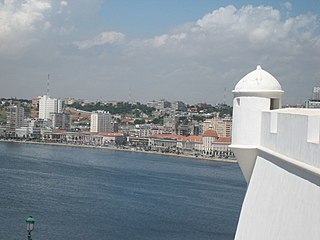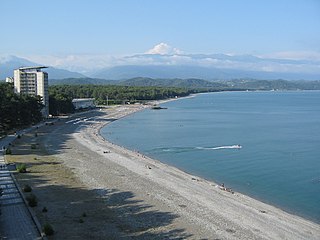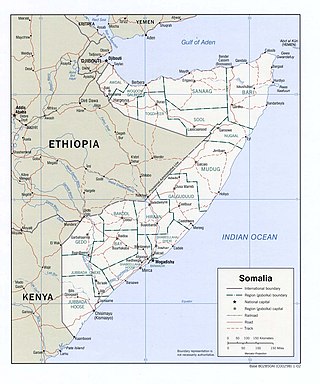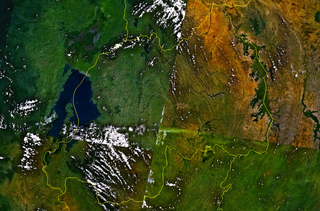
United Nations Security Council resolution 884, adopted unanimously on 12 November 1993, after reaffirming resolutions 822 (1993), 853 (1993) and 874 (1993), the Council expressed its concern at the continuing conflict between Armenia and Azerbaijan in Nagorno-Karabakh and condemned violations of the ceasefire between the parties, particularly the occupation of the Zəngilan district and city of Goradiz. Resolution 884 is the fourth and last of the resolutions adopted by the UN Security Council regarding the Nagorno-Karabakh conflict.

United Nations Security Council resolution 804, adopted unanimously on 29 January 1993, after reaffirming resolutions 696 (1991), 747 (1992), 785 (1992) and 793 (1992), and expressing its concern at lack of implementation of the "Acordos de Paz para Angola" in Angola, the council approved a recommendation by the Secretary-General Boutros Boutros-Ghali to extend the mandate of the United Nations Angola Verification Mission II for a further three months until 30 April 1993.

United Nations Security Council resolution 812, adopted unanimously on 12 March 1993, after expressing its alarm at the humanitarian situation in Rwanda due to the ongoing civil war, in particular the number of refugees and displaced persons which posed an international threat to peace and security, the Council called upon the Government of Rwanda, the National Republican Movement for Democracy and Development, and the Rwandan Patriotic Front to respect a ceasefire that took place on 9 March 1993 and implement other agreements they had committed themselves to. It was the first resolution on the situation in Rwanda.

United Nations Security Council resolution 823, adopted unanimously on 30 April 1993, after reaffirming resolutions 696 (1991), 747 (1992), 785 (1992), 793 (1992), 804 (1993) and 811 (1993), the Council expressed support for the ongoing peace talks in Abidjan between the Government of Angola and UNITA under United Nations auspices and decided to extend the mandate of the United Nations Angola Verification Mission II until 31 May 1993.

United Nations Security Council resolution 827, adopted unanimously on 25 May 1993, after reaffirming Resolution 713 (1991) and all subsequent resolutions on the topic of the former Yugoslavia, approved report S/25704 of Secretary-General Boutros Boutros-Ghali, with the Statute of the International Tribunal as an annex, establishing the International Criminal Tribunal for the former Yugoslavia (ICTY).

United Nations Security Council resolution 833, adopted unanimously on 27 May 1993, after recalling resolutions 687 (1991), 689 (1991), 773 (1992) and 806 (1993) in addition to a report by the Secretary-General Boutros Boutros-Ghali, the council noted the continuing work of the United Nations Iraq-Kuwait Boundary Demarcation Commission.

United Nations Security Council resolution 834, adopted unanimously on 1 June 1993, after reaffirming resolutions 696 (1991), 747 (1992), 785 (1992), 793 (1992), 804 (1993), 811 (1993) and 823 (1993), the council indicated its concern at the deteriorating political, military and humanitarian situation in Angola and extended the mandate of the United Nations Angola Verification Mission II for a period of 45 days ending 15 July 1993.

United Nations Security Council resolution 852, adopted unanimously on 28 July 1993, after recalling previous resolutions on the topic including 501 (1982), 508 (1982), 509 (1982) and 520 (1982) as well as studying the report by the Secretary-General on the United Nations Interim Force in Lebanon (UNIFIL) approved in 426 (1978), the Council decided to extend the mandate of UNIFIL for a further six months until 31 January 1994.

United Nations Security Council resolution 854, adopted unanimously on 6 August 1993, after recalling Resolution 849 (1993) which concerned a deployment of military observers if a ceasefire was observed between Abkhazia and Georgia, the Council noted that a ceasefire had been signed and approved a dispatch of 10 military observers to the area to observe the implementation of the ceasefire.

United Nations Security Council resolution 877, adopted unanimously on 21 October 1993, after recalling 808 (1993) and 827 (1993), the Council appointed the nomination by the Secretary-General Boutros Boutros-Ghali of Mr. Ramón Escovar Salom for the position of Prosecutor at the International Criminal Tribunal for the former Yugoslavia (ICTY).

United Nations Security Council resolution 878, adopted unanimously on 29 October 1993, after reaffirming resolutions 733 (1992), 746 (1992), 751 (1992), 767 (1992), 775 (1992), 794 (1992), 814 (1993), 837 (1993) and 865 (1993) on Somalia, the Council expressed its commitment to a future concerted strategy for the United Nations Operation in Somalia II and extended its mandate for an interim period until 18 November 1993.

United Nations Security Council resolution 881, adopted unanimously on 4 November 1993, after reaffirming resolutions 849 (1993), 854 (1993), 858 (1993) and 876 (1993) concerning the Georgian–Abkhazian war, the Council extended the mandate of the United Nations Observer Mission in Georgia (UNOMIG) until 31 January 1994.

United Nations Security Council resolution 885, adopted unanimously on 16 November 1993, after reaffirming resolutions 733 (1992), 746 (1992), 751 (1992), 767 (1992), 775 (1992), 794 (1992), 814 (1993), 837 (1993), 865 (1993) and 878 (1993) on Somalia and Resolution 868 (1993) on the safety of United Nations peacekeeping personnel, the council authorised the establishment of a Commission of Inquiry to investigate attacks on the United Nations Operation in Somalia II which led to casualties.

United Nations Security Council resolution 887, adopted unanimously on 29 November 1993, after considering a report by the Secretary-General Boutros Boutros-Ghali regarding the United Nations Disengagement Observer Force (UNDOF), the Council noted its efforts to establish a durable and just peace in the Middle East.

United Nations Security Council resolution 889, adopted unanimously on 15 December 1993, after recalling Resolution 186 (1964) and other relevant resolutions on Cyprus, the council noted a report of the Secretary-General Boutros Boutros-Ghali and extended the mandate of the United Nations Peacekeeping Force in Cyprus (UNFICYP) until 15 June 1994.

United Nations Security Council resolution 892, adopted unanimously on 22 December 1993, after reaffirming resolutions 849 (1993), 854 (1993), 858 (1993), 876 (1993) and 881 (1993) on the Georgian–Abkhazian war and Resolution 868 (1993) concerning the safety of United Nations peacekeepers, the council discussed the phased deployment of 50 military observers in Georgia.

United Nations Security Council resolution 893, adopted unanimously on 6 January 1994, after reaffirming resolutions 812 (1993), 846 (1993), 872 (1993) and 891 (1993) on Rwanda, the Council noted that the situation in Rwanda could have implications for neighbouring Burundi and authorised the deployment of a second military battalion of the United Nations Assistance Mission for Rwanda (UNAMIR) to the demilitarised zone.

United Nations Security Council resolution 895, adopted unanimously on 28 January 1994, after recalling previous resolutions on Israel and Lebanon including 501 (1982), 508 (1982), 509 (1982) and 520 (1982) as well as studying the report by the Secretary-General Boutros Boutros-Ghali on the United Nations Interim Force in Lebanon (UNIFIL) approved in 426 (1978), the Council decided to extend the mandate of UNIFIL for a further six months until 31 July 1994.

United Nations Security Council resolution 899, adopted unanimously on 4 March 1994, after recalling Resolution 833 (1993) and considering a letter by the Secretary-General Boutros Boutros-Ghali concerning the matter of the Iraqi private citizens and their assets which remained on Kuwaiti territory following the demarcation of the international boundary between Iraq and Kuwait, the council, acting under Chapter VII of the United Nations Charter, decided that compensation payments may be remitted to the private citizens concerned in Iraq, notwithstanding the provisions of Resolution 661 (1991).

United Nations Security Council resolution 905, adopted unanimously on 23 March 1994, after recalling resolutions 841 (1993), 861 (1993), 862 (1993), 867 (1993), 873 (1993) and 875 (1993), on the situation in Haiti, the council extended the mandate of the United Nations Mission in Haiti (UNMIH) until 30 June 1994.




















